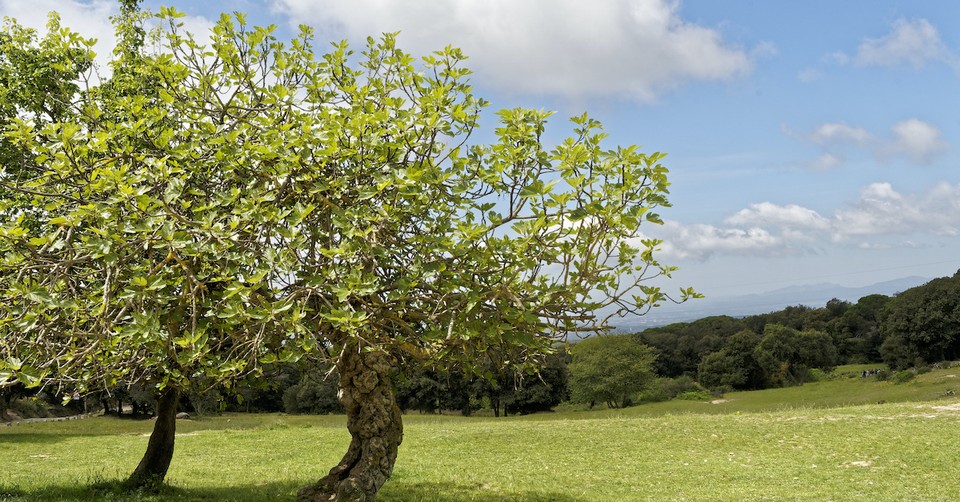What Can We Learn from the Parable of the Fig Tree?

In Luke 13:6-9, we hear Jesus tell a parable about a barren fig tree that should make us pause.
The story goes like this:
A man had a fig tree growing in his vineyard, and he went to look for fruit on it but did not find any. So he said to the man who took care of the vineyard, ‘For three years now I’ve been coming to look for fruit on this fig tree and haven’t found any. Cut it down! Why should it use up the soil?’
‘Sir,’ the man replied, ‘leave it alone for one more year, and I’ll dig around it and fertilize it. If it bears fruit next year, fine! If not, then cut it down.’
Jesus used everyday examples and parables to relate His messages about our spiritual lives to everyday experiences and things listeners would understand. In those days, trees were symbolic of living a godly life. From the very beginning in the first few passages of Genesis, to the first psalm, to the first pages of the New Testament, and even when Christ returns, there’s a reference of a tree. Not because God really likes trees but because He labors in us to produce godly fruit.
Trees provide a framework for the biblical story of us. Trees were the only item mentioned in the Bible as pleasing to the eye in the creation account. Trees—the tree of life with its lifegiving fruit and the tree of the knowledge of good and evil was used as parameters for the metaphor of the whole Bible. Between the tree of life in Genesis and in Revelation, how are we to live? Like a tree!
What Is the Meaning of the Parable of the Fig Tree?
When Jesus told the parable of the fig tree, He was trying to get our attention because He is the master gardener. He always nourishes and protects. He prunes off the dead parts of our lives that won’t serve us. He’s tender to our new vines and branches.
He shows up with sturdy gloves and an eye for detail. He shows up wearing old blue jeans, an old white shirt, and a hat; ready to get to work as we lay ourselves before Him as He tells us, “No branch can bear fruit by itself; it must remain on the vine” (John 15:4). The vine He created was for the purpose of staying rooted and bearing fruit through Him. He reminds us, “This is to my Father’s glory, that you bear much fruit, showing yourselves to be my disciples”(John 15:8). When He talks about each us of us, His eyes shine as He takes pride in the work of our lives even when the work He is doing feels more like loss of life than actual living.
This is the meaning of the fig tree in Luke 13:6-9. Jesus wants us to live our lives for God. He wants us to ensure we stay deeply rooted in His Word, in His Presence in all that we do. As He tends to our branches, He expects a fruitful return of His investment because He willingly paid dearly through the death on the cross. It covered our sins and in return, He wants to see each of us adding to the Kingdom of God with our hearts, our speech, and in all that we do.
The Nation of Israel and the Individual
The Fig tree in this parable represents us and the nation of Israel. The vineyard owner in this story is God, the One who rightly decides whether or not to uproot the trees that are not bearing fruit. As the story unfolds, we see God is disappointed because it lacked any fruit after caring for the tree for three years.
The Three Years
The three years in this story represent John the Baptist, Jesus, and their ministry as they preached repentance to the nation of Israel. John the Baptist warned the people about the coming Messiah. He told them to bring the fruit of their hearts to Christ because the ax was already at the root of the tree. But the Jewish people were offended at the idea they needed to repent. Then they rejected the Messiah because Jesus demanded a clean heart, a clean slate via repentance. They had created their own system of human works righteousness which was never God’s intention.
3 Lessons Christians Can Learn From the Parable of the Fig Tree
In this story we see stubborn hearts riddled with pride. The Jewish people felt their actions, deeds, and the states of their hearts were righteous despite God pointing out their sins. As followers of Christ, we have to make a decision: live for ourselves or live on in the vine in Christ.
God Is Willing to Forgive & Is Patient
The good news from this story is God, the Master Gardener is merciful and willing to forgive. He is patient but His patience will run out. Neither you nor I want to be on the receiving end of the ax. It’s better to repent and turn from the sins that are preventing us from living fully for Christ before His patience runs out.
Stay Rooted in Christ
The fruit tree (each of us) requires a lot of time, investment, and proper handling to enjoy its fruit year after year. It’s a reward to see an apple tree or fig tree weighed down with its luscious fruit ripe for the picking even through life’s storms. We have no control over our circumstances, but we do have control over how we respond. Do we blame God, or do we dig our roots in deeper? In this parable, Jesus knows we’re human, we’re frail, we have weaknesses and temptations. But it’s up to us to rely on Jesus for the strength and wisdom to navigate what comes our way.
Jesus Doesn’t Tolerate False Appearances
Jesus cursed the fig tree because it had the appearance of fruitfulness, but it was deceptive. It didn’t produce fruit. This falseness is the essence of hypocrisy. The Bible is full of verses where Jesus addressed hypocrisy. He witnessed it so often, He used the tree in this story as a vivid depiction of it. The day before He told this parable, He had entered the temple courts to find His Father’s house turned into a market filled with people who didn’t care about God but were taking advantage of those hearts who wanted to honor Him. It wasn’t just about making a quick buck. He doesn’t want us to be whitewashed tombs. Our time to choose Him and bear fruit is running out.
The key to understanding this valuable lesson is abiding in Christ. John 15:1-11 says:
“I am the real vine, and my Father is the gardener. Every branch which is part of me but fails to bear fruit, he cuts off; and every branch that does bear fruit, he prunes, so that it may bear more fruit. Right now, because of the word which I have spoken to you, you are pruned. Stay united with me, as I will with you — for just as the branch can’t put forth fruit by itself apart from the vine, so you can’t bear fruit apart from me. I am the vine and you are the branches. Those who stay united with me, and I with them, are the ones who bear much fruit; because apart from me you can’t do a thing. Unless a person remains united with me, he is thrown away like a branch and dries up. Such branches are gathered and thrown into the fire, where they are burned up. If you remain united with me, and my words with you, then ask whatever you want, and it will happen for you. This is how my Father is glorified — in your bearing much fruit; this is how you will prove to be my talmidim. Just as my Father has loved me, I too have loved you; so stay in my love. If you keep my commands, you will stay in my love — just as I have kept my Father’s commands and stay in his love. I have said this to you so that my joy may be in you, and your joy be complete.”
Photo credit: ©GettyImages/ShaharKlein

This article is part of our larger resource library of popular Bible parables. We want to provide easy to read articles that answer your questions about the meaning, origin, and history of parables within Scripture. It is our hope that these will help you better understand the meaning and purpose of God's Word in relation to your life today.
Parable of the Lost Sheep
Parable of the Talents
Parable of the Good Samaritan
Parable of Wheat and Tares
Originally published December 03, 2020.





